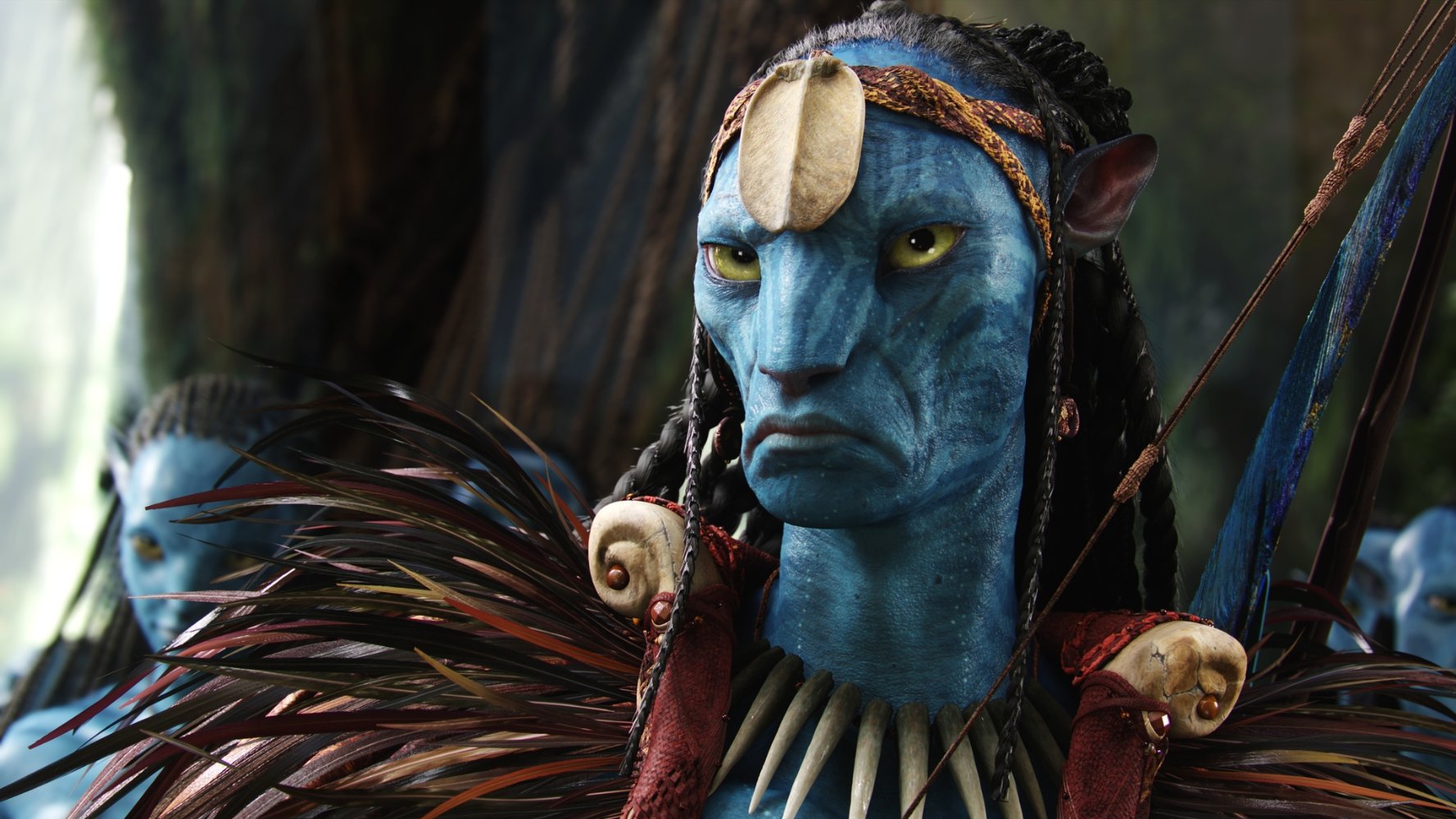5. The love story is derivative
![]()
Partly due to the special effects, the central love story of the film is unable to attain anything more than symbolic status. That is to say, it is words on a page that put characters through emotions but none of them ever feel real. Again, Worthington and Saldana are fine and they do their best, but their characters’ love has no depth.
The star-crossed lovers bit is older than Shakespeare. Two warring factions, ready to murder each other, discover that two of their own are actually in love. Those lovers then have to make a choice: stay on their side and fight against their love or find some way to prevent the fight or participate in it. Though this version of a love story can be compelling, when combined with all of the issues above, it makes for a lackluster romance.
Neytiri and Jake’s relationship is built on lies and Neytiri–even at the conclusion of the movie–never really gets to know the real Jake Sully. (Many would argue that the “real” Jake is the one who becomes a Na’vi. While that is an interesting figurative interpretation, it doesn’t erase the fact that the superficiality of their love barely surpasses script requirement.)
When Neytiri saves Jake by dispatching Stephen Lang’s Colonel Quaritch and then putting on his mask, it is an emotional moment to be sure. However, it is a moment that most audience members anticipated many moments before it transpired, having seen versions of it many times before.
6. The movie is overly long

When a movie stretches to two hours and forty minutes, viewers need to feel like every scene is essential and every moment serving a purpose. Though illustrating the beauty and majesty of nature is integral to the story that Avatar tells, many of the scenes that depict Jake and the natives connecting with nature are drawn out. They get to showcase the regal CGI backgrounds, but serve to belabor the point.
Like Peter Jackson’s King Kong, Avatar and Cameron seem to believe that any excuse to create an interesting animal or a busy but alluring background is a valid excuse; by the same token, they believe that extending the time the audience spends with those animals and backdrops is time well spent. However, that is not always the case.
Avatar has countless scenes that could have been cut to shorten the mammoth running time and tighten the screws of the story. This is not to suggest that audiences are exhausted by Avatar’s length, simply annoyed when some moments don’t earn their time.
7. Its thematic implications are pedestrian
![]()
Movies are meant to be entertaining. The themes and lessons that audiences internalize from films are just a bonus for many. Nonetheless, the greatest movies of all time offer more than just thrills and chills. Avatar struggles, though, to give more than just a great time at the movies. Like Titanic, its themes are obvious and blunt. Here, you have the straightforward idea that oppressive nations should not push out indigenous peoples. Also, the well-tread moral of overcoming your own biases in pursuit of love and affection.
Those themes are driven home by characters that are barely more than tropes. With the fire-breathing, bloodthirsty general; the money-grubbing, ultimately cowardly CEO-type; the gentle but determined scientist; and the semi-nerdy, loyal sidekick, many of the common cinematic stereotypes are present and accounted for, standing in for the deeper and more complex individuals that could populate a more resonant story.
The climactic battle scenes elicit the reaction that they are aiming for: raw passion and unabashed sentimentality. The audience, though, hasn’t learned anything they didn’t already know or believe and, besides that, there was nothing for them to contemplate on their own, since everything was spelled out in loud capital letters.
8. The money it made overshadowed everything above
![]()
The bottom line in Hollywood is money. Avatar made startling (almost hard to fathom at the time) amounts of it, which made it seem–for a time–better than it actually was. Eight years on, though, the money that it made no longer protects it from the criticisms that bubbled under the surface. Perhaps forever it will be one of the top-grossing movies of all time. Now, though, it is seen as a crowd-pleasing popcorn flick and not as the visionary epic it was once declared.
About two years ago, Star Wars, Episode VII — The Force Awakens passed Avatar as the top-grossing film of all time. The amount of money that a movie makes gives it cachet and speaks to its ability to please a multitude of audience members (and often please them during a multitude of viewings). What that amount of money does not do is guarantee that a movie’s impact will stand the test of time.
Though this seems like an obvious principle, Avatar is perhaps the starkest example of it. As ticket prices go up, some well-made, well-focus-grouped movies are going to probably (eventually) pass Avatar on the box office charts. Some of them will be worthy of doing so and others will definitely not be. Avatar will continue to stand as a solid, exciting, often visually stunning entertainment. It is evident now, though, that it is not quite the classic it once felt like it might be.
Author Bio: Chad Durham is co-editor and contributing writer for RogueAuteurs.com. He also participates bi-monthly in the Rogue Auteurs podcast. His day job is high school English teacher. He has been in love with movies since seeing The Sting when he was 12. The thrill and emotion of seeing a great movie for the first time will always be one of his favorite feelings.